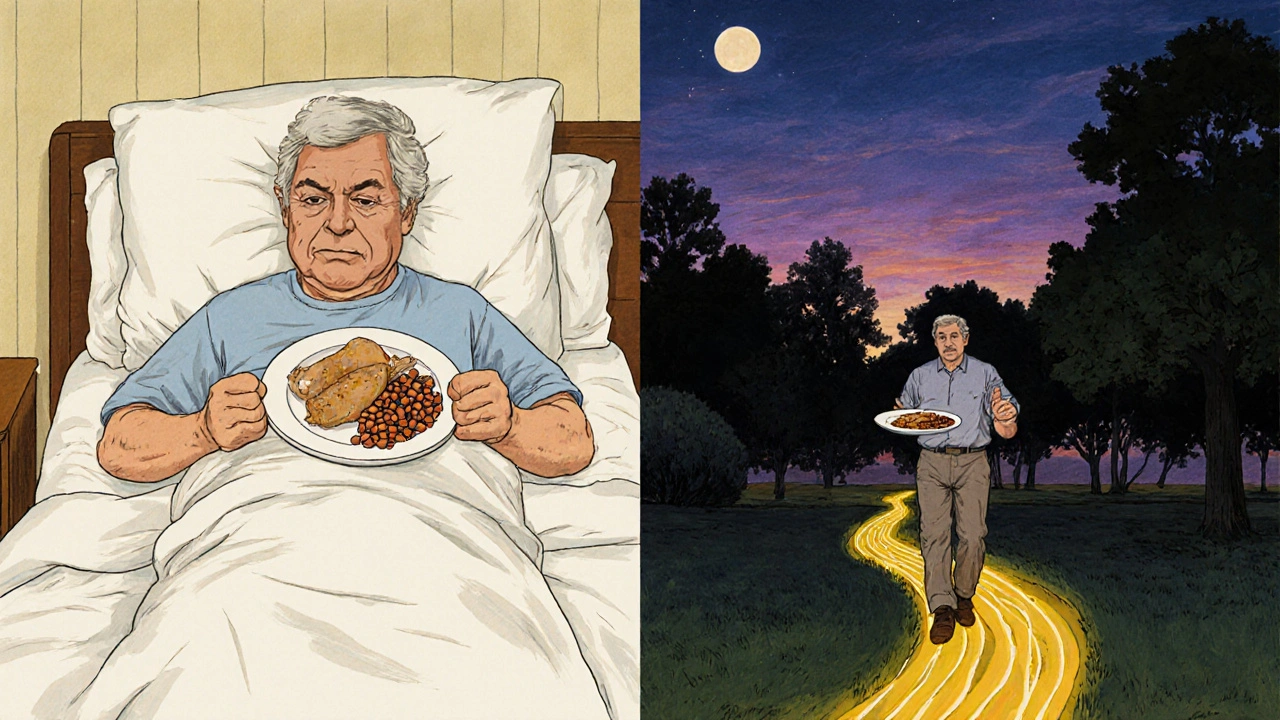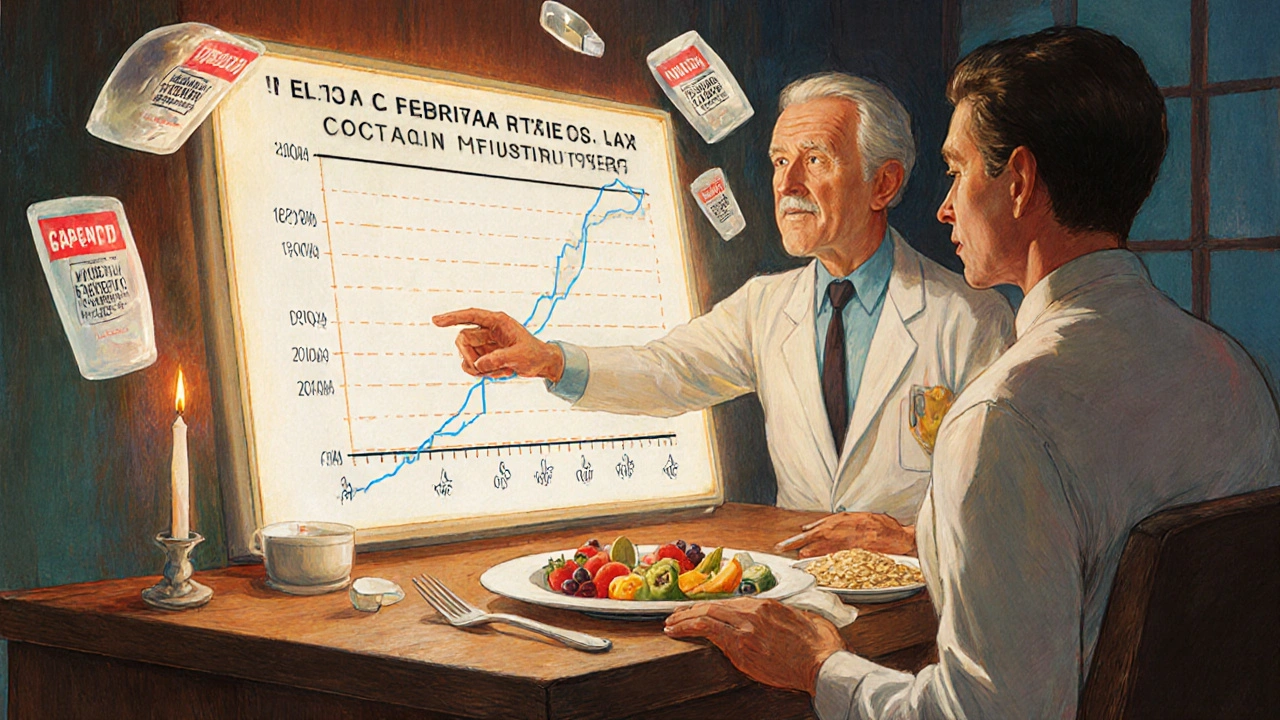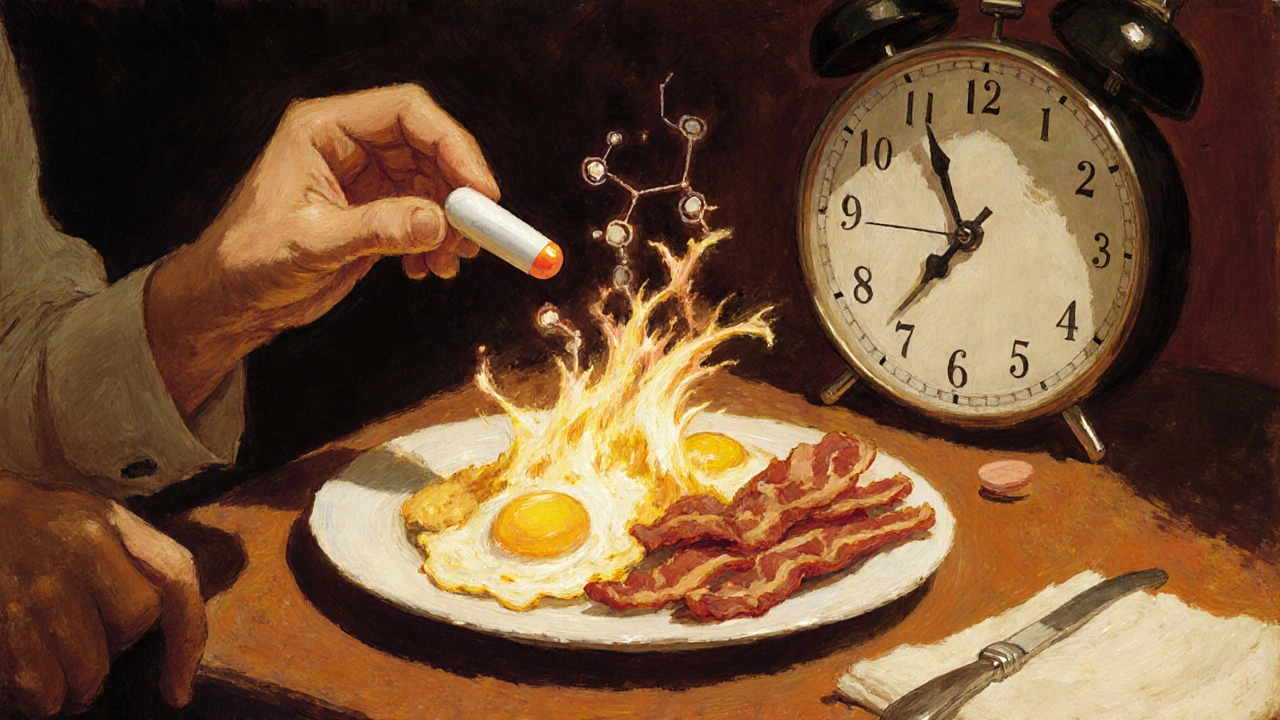Protein-Medication Interaction Calculator
How Protein Affects Your Medication
Protein-rich foods compete with medications like levodopa for absorption. Find the right timing to maximize effectiveness.
Protein-rich foods
- 3-ounce chicken breast: 26g protein
- 1 cup milk: 8g protein
- 1 egg: 6g protein
- 1/2 cup lentils: 9g protein
- 1/2 cup cottage cheese: 14g protein
- 1 scoop protein powder: 25-30g protein
When you take a pill, you might think it goes straight to work. But what you ate 30 minutes before that pill could be blocking it entirely. For people on medications like levodopa for Parkinson’s disease, a high-protein breakfast isn’t just a healthy choice-it’s a potential treatment saboteur. The same protein that builds muscle and fuels your day can interfere with how well your medicine works, sometimes cutting its effectiveness in half. This isn’t theoretical. It’s happening every day to thousands of patients who never knew their eggs or chicken breast were working against them.
How Protein Blocks Medication Absorption
Protein-rich foods don’t just fill you up-they flood your bloodstream with amino acids. Within 30 minutes of eating a meal with 20 grams or more of protein, your body has 200-300% more amino acids circulating than before. These amino acids use the same transport system in your gut and brain as certain medications, especially levodopa. Think of it like a crowded elevator: only so many people can get on at once. When amino acids pile in, levodopa gets pushed out. This competition happens at the large neutral amino acid transporters (LNAATs). These are the gates that let specific molecules cross the blood-brain barrier. Levodopa, a key Parkinson’s drug, needs those gates to reach the brain and turn into dopamine. But so do leucine, isoleucine, valine, tyrosine, and other amino acids from meat, dairy, eggs, and legumes. When you eat protein, those amino acids win the race. Levodopa waits-and by the time it gets through, it’s too late to make a difference. The result? A 30-50% drop in levodopa absorption, according to Parkinson’s Canada’s 2025 fact sheet. That’s not a small delay. It’s enough to turn a patient’s "on" time-when symptoms are under control-into "off" time, with tremors, stiffness, and freezing returning. Studies show this happens in about 60% of Parkinson’s patients who eat protein with their meds.Which Medications Are Affected?
Levodopa is the most well-known, but it’s not alone. The Biopharmaceutics Classification System (BCS) helps explain why some drugs are more vulnerable than others. Drugs in BCS Class III-high solubility, low permeability-are the ones most likely to be blocked by protein. That’s because they rely on transporters to get absorbed, not just passive diffusion. Here’s what else can be affected:- Carbidopa/levodopa combinations: Bioavailability drops 25% with just 50 grams of protein in a meal.
- Penicillin antibiotics: Absorption can drop 15-20% when taken with a protein-heavy meal, reducing their ability to fight infection.
- Some antiepileptic drugs: Like gabapentin and pregabalin, which also use amino acid transporters.
- Propranolol: A beta-blocker whose absorption may be slowed by protein, altering its peak effect time.
Why Fat and Fiber Don’t Work the Same Way
You might think all food is the same when it comes to pills. But protein behaves differently than fat or fiber. High-fat meals slow down stomach emptying by 60-90 minutes. That delays absorption of many drugs, but it doesn’t block them the way protein does. Fat might make a drug take longer to kick in, but it usually doesn’t stop it from working entirely. Fiber, on the other hand, can bind to drugs like statins and reduce their absorption by 15-20%. But again, it’s a physical trapping effect-not a competitive one. Protein doesn’t trap the drug. It outcompetes it for a ride into the bloodstream. This distinction matters because people often hear "avoid food with meds" and assume all meals are equal. But skipping breakfast entirely isn’t the answer. You need to manage protein, not all food.
Real-World Impact: What Happens When Patients Ignore This
In a 2023 survey of 1,243 Parkinson’s patients by the Michael J. Fox Foundation, 57% said they initially struggled with timing their meds around meals. Many took levodopa with breakfast, thinking it was the best time to start the day. Instead, they spent their mornings stiff and slow. One patient, a 68-year-old retired teacher, took her levodopa at 7 a.m. with scrambled eggs and whole milk. Her symptoms didn’t improve. She thought the medication wasn’t working. Her neurologist found her protein intake was 85 grams a day-mostly at breakfast and lunch. After switching to a protein-redistribution plan-eating only 30 grams in the morning and afternoon, and 55 grams at dinner-her "on" time jumped from 4.1 hours to 6.6 hours daily. She went from needing help to get out of bed to walking her dog again. But not everyone succeeds. A 2024 study in the Journal of Parkinson’s Disease found that 23% of patients on strict low-protein diets developed muscle wasting within 18 months. Cutting protein too much isn’t safe either. The goal isn’t to eliminate protein-it’s to time it right.What Experts Say: The Gap Between Knowledge and Practice
Dr. Alberto Espay, a leading Parkinson’s specialist and 2023 H. Houston Merritt Award winner, calls protein-redistribution diets "underutilized despite strong evidence." He’s right. A 2024 American Society for Nutrition report found that 68% of clinicians never discuss protein timing with patients starting levodopa. The problem isn’t just doctors. Drug labels are often silent. The European Medicines Agency’s 2024 review found that 61% of medication guides don’t mention protein interactions-even for drugs like levodopa where the evidence is clear. Dr. Robert A. Venuto from the University of Rochester points out that protein interactions account for 12-15% of therapeutic failures in Parkinson’s cases. Yet only 37% of neurologists routinely ask about protein intake. It’s not that doctors don’t know. It’s that no one’s asking patients the right questions.
How to Get It Right: Practical Strategies
You don’t need to become a nutritionist. But you do need a simple plan. 1. Take meds 30-60 minutes before meals. This is the gold standard for levodopa and similar drugs. If you eat at 8 a.m., take your pill at 7:15 a.m. Use a timer. Set a phone alert. Don’t guess. 2. Save protein for dinner. Aim to get 70% of your daily protein at your evening meal. Breakfast and lunch should be low-protein: oatmeal with fruit, toast with jam, rice cakes, vegetables, and fruit. You can still get enough protein-just spread it out. 3. Know your protein sources. A 3-ounce chicken breast has 26 grams. One cup of milk has 8 grams. A granola bar? Often 7 grams. A protein shake? Up to 30 grams. Read labels. Track intake for a week using an app like ProteinTracker for PD (developed by Johns Hopkins, rated 4.7/5). 4. Use low-protein alternatives. Some brands now make protein-modified bread (2g per slice instead of 5g), low-protein pasta, and protein-free shakes. These aren’t gimmicks-they’re tools. 5. Don’t skip snacks if you’re nauseous. If your meds upset your stomach, have a low-protein snack like a banana or apple. Avoid yogurt, nuts, or cheese. Those will still interfere. The University of Florida Health found that with just 3-4 sessions with a registered dietitian, 85% of patients stick to this plan after three months.New Solutions on the Horizon
The field is evolving fast. In 2015, the FDA approved Duopa-a gel form of carbidopa-levodopa delivered directly into the small intestine. It bypasses the stomach entirely, making protein timing irrelevant. In 2024, Medicare recorded over 12,000 new users. A 2025 study from the Michael J. Fox Foundation found that time-restricted eating-eating all protein between noon and 8 p.m.-improved levodopa efficacy by 32% without risking malnutrition. Even more promising: research in Nature Medicine (March 2025) shows certain probiotics may reduce amino acid competition in the gut by 25%. That could mean fewer dietary restrictions in the future. The FDA is now drafting a new labeling system: a "Protein Interaction Score"-similar to alcohol warnings-that would appear on drug packaging. By 2030, personalized algorithms, currently in Phase II trials at Massachusetts General Hospital, could predict exactly how much protein each patient can safely eat with their meds.What You Should Do Now
If you’re on any medication-especially for Parkinson’s, epilepsy, or infections-ask yourself:- When do I take my pills?
- What did I eat 30 minutes before?
- Do I feel worse after meals?
Can I eat protein if I take medication?
Yes, but timing matters. For medications like levodopa, avoid high-protein meals within 30-60 minutes before or after taking the drug. Save most of your daily protein for dinner to minimize interference with daytime symptom control.
Does all protein affect medications the same way?
No. Animal proteins like meat, dairy, and eggs are higher in the amino acids that compete with drugs. Plant proteins like beans and tofu also contain these amino acids but in lower amounts. The key isn’t the source-it’s the total grams. A 30g protein shake has the same effect as a chicken breast.
What if I forget and take my pill with food?
Don’t panic. Take your next dose on schedule, and avoid protein for the next 2 hours. If you’re on levodopa and feel your symptoms returning, talk to your doctor about adjusting your dose or switching to a formulation like Duopa that bypasses stomach absorption.
Are there medications that work better with protein?
Rarely. Some antibiotics may absorb slightly better with protein due to increased blood flow to the gut. But for most drugs-especially those targeting the brain or requiring precise timing-protein reduces effectiveness. Never assume protein helps unless your doctor confirms it.
Can I just take a low-protein diet to avoid the problem?
Not safely. A very low-protein diet (<0.8g/kg/day) can cause muscle loss, weakness, and slower healing. The goal isn’t to eliminate protein-it’s to time it so it doesn’t interfere with your medication. Most experts recommend 0.8-1.0g/kg/day, with 70% consumed at dinner.
How do I know if my medication is affected by protein?
Check if your drug is used for Parkinson’s, epilepsy, or certain infections. Look for terms like "levodopa," "carbidopa," "gabapentin," or "pregabalin" on your prescription. Ask your pharmacist if it’s a BCS Class III drug. If you notice your symptoms worsen after meals, protein timing could be the cause.
If you’re managing a chronic condition and taking oral medication, your diet isn’t just about health-it’s part of your treatment plan. Protein isn’t the enemy. Ignorance is. The right timing turns food from a barrier into a tool.


Scott Macfadyen
November 18, 2025 AT 06:46So let me get this straight - I’ve been eating eggs with my meds for years and now you’re telling me my tremors weren’t from Parkinson’s, they were from my breakfast? Thanks for the existential crisis before coffee.
Chloe Sevigny
November 19, 2025 AT 21:16The biochemical competition at the LNAAT transporters represents a paradigmatic failure of reductionist pharmacology - the body’s nutrient transport systems are evolutionarily optimized for homeostasis, not pharmaceutical precision. We’re essentially asking a 300,000-year-old physiological architecture to accommodate 20th-century synthetic molecules without acknowledging the epistemic violence of this imposition.
It’s not merely a matter of timing; it’s a symptom of biomedical hegemony. Why aren’t we designing drugs that don’t hijack amino acid pathways? Why not engineer levodopa analogs with distinct transport kinetics? The answer lies not in dietary compliance, but in structural reform of pharmaceutical development.
And yet, the burden is placed on the patient: ‘Eat protein at dinner.’ As if the working class can afford to eschew breakfast protein, or as if cognitive load isn’t already saturated by the choreography of pill schedules, meal logs, and insurance denials.
This isn’t medicine. It’s a logistical nightmare disguised as a therapeutic protocol. We’ve outsourced pharmacokinetics to the kitchen.
And let’s not pretend this is unique to Parkinson’s. The same dynamic plays out with thyroid meds, bisphosphonates, and even SSRIs. The system doesn’t care if your body has a breakfast.
The real scandal? The FDA’s silence. The drug labels don’t warn because the pharmaceutical-industrial complex profits from chronic symptom fluctuation - it drives repeat prescriptions, specialist visits, and device sales.
Duopa? Great. But it’s a Band-Aid on a systemic wound. And at $100,000/year? That’s not innovation. That’s extraction.
Probiotic modulation? Fascinating. But again - a stopgap. We need to stop treating biology like a software bug to be patched with dietary rules.
Maybe the real solution is to stop prescribing drugs that require such elaborate gymnastics to function. Maybe we need to fund more research into non-transport-dependent analogs. Or better yet - fund nutritionists in every neurology clinic.
Until then, we’re just teaching patients to be pharmacological acrobats while the industry collects the ticket sales.
Denise Cauchon
November 20, 2025 AT 11:48OMG I CRIED READING THIS 😭 I’VE BEEN TAKING MY LEVODOPA WITH MY CHICKEN BURRITO SINCE 2018 AND NOW I KNOW WHY I COULDN’T WALK ON MONDAYS 😭 I’M SWITCHING TO JUST OATMEAL AND BANANAS FROM NOW ON 🙏 #ProteinIsTheEnemy
Andrea Johnston
November 21, 2025 AT 06:06Oh, so now my 7 a.m. protein shake is why I’ve been freezing mid-sentence? Shocking. Just like how my vitamin D deficiency was ‘caused’ by my sunscreen. Everything’s always the patient’s fault, isn’t it? We’re just supposed to rearrange our entire lives around a drug that doesn’t even play nice with human biology.
And don’t get me started on the cost of ‘low-protein pasta’ - it’s like $8 a box. Meanwhile, a can of beans is $0.89. So now I’m supposed to pay more for fake food so I can take my medicine? Brilliant.
Meanwhile, the pharmaceutical companies are laughing all the way to the bank with their $120,000 Duopa pumps. Real innovation. Real compassion.
And the fact that 68% of doctors don’t even mention this? That’s not negligence. That’s negligence with a side of profit motive.
Next they’ll tell me to stop breathing because oxygen interferes with my blood pressure meds.
Victoria Malloy
November 21, 2025 AT 17:19This is actually really helpful. I’ve been struggling with my meds for months and never connected it to food. I’m going to try the protein redistribution plan - and I’ll start with just moving my protein to dinner. Small steps, right?
Alex Czartoryski
November 22, 2025 AT 20:27Everyone’s acting like this is new info. Newsflash: this has been in medical journals since the 90s. You think your neurologist didn’t know? They just assume you’re too dumb to follow basic instructions. Also, ‘protein redistribution’ sounds like a cult. Who came up with that? A marketing team?
And the ‘low-protein bread’? That’s just flour with a fancy label. You’re paying $12 for a slice of cardboard that tastes like regret.
Here’s the real solution: take your meds on an empty stomach. No drama. No diet plans. No expensive pasta. Just don’t eat for an hour before. Simple. Why is this so hard?
Gizela Cardoso
November 24, 2025 AT 18:17I’m a dietitian who works with neuro patients, and I can confirm - this works. The biggest hurdle isn’t the science, it’s the emotional weight. People feel guilty for eating meat. They feel like they’re failing if they can’t stick to the plan. But it’s not about perfection. It’s about consistency. Even shifting 50% of protein to dinner helps. You’re not doing it wrong - you’re just learning.
Also, the Johns Hopkins app? Life-changing. Free, easy, and actually accurate. Use it.
Premanka Goswami
November 25, 2025 AT 21:25They don’t want you to know the truth. This isn’t about protein. It’s about the glyphosate in your eggs, the fluoride in your milk, and the corporate labs that designed levodopa to make you dependent. The ‘amino acid competition’? A distraction. The real enemy is the medical-industrial complex that profits from your confusion. They don’t want you to heal - they want you to keep buying. The ‘protein redistribution’ is a trap. Stay vigilant.
Alexis Paredes Gallego
November 25, 2025 AT 23:19Oh wow, so protein is bad? What’s next? Is water bad for your blood thinners? Is oxygen a drug interaction? This is the dumbest thing I’ve read all year. My grandma took her pills with bacon and lived to 94. You people are pathologically overcomplicating medicine. Also, Duopa? That’s just a fancy IV drip with a price tag. I bet Big Pharma paid someone to write this whole thing.
Shravan Jain
November 26, 2025 AT 02:22It is imperative to note that the aforementioned biochemical competition at the level of the LNAAT transporters is not merely a pharmacokinetic anomaly, but rather a systemic failure of translational medicine to account for evolutionary biochemistry. The human gut, having evolved under conditions of intermittent protein availability, possesses no adaptive mechanism for the chronic, high-protein, pharmaceuticalized diet of the 21st century. Consequently, the therapeutic efficacy of levodopa is not diminished by dietary protein per se, but by the pathological mismatch between ancestral physiology and modern pharmacological intervention. One must therefore conclude that the onus lies not upon the patient to reconfigure their alimentary rhythm, but upon the scientific community to engineer pharmacological agents that are congruent with human biology - not the other way around.
Furthermore, the commercialization of ‘low-protein’ foodstuffs constitutes a predatory innovation, exploiting patient vulnerability for profit. The fact that such products are marketed as ‘medical foods’ while being priced at 500% above conventional alternatives is not merely unethical - it is a violation of the Hippocratic Oath by proxy.
And yet, the FDA, in its infinite wisdom, continues to permit such labeling without mandatory disclosure of cost-benefit ratios. One must ask: who benefits? Not the patient. Not the physician. Only the shareholders.
It is my professional opinion that the current paradigm is unsustainable, inequitable, and fundamentally unscientific. The solution lies not in dietary manipulation, but in the development of non-transport-dependent dopaminergic agonists - a field that remains woefully underfunded.
Until then, we are merely rearranging deck chairs on the Titanic - while charging for the napkins.